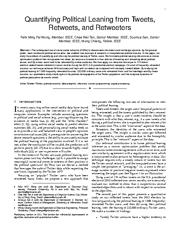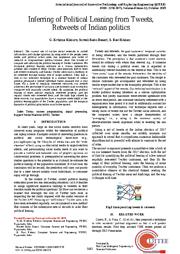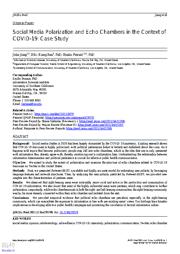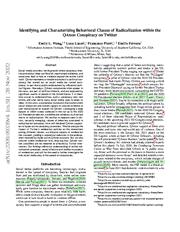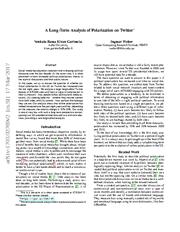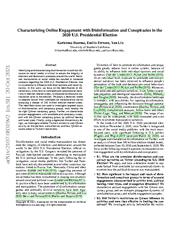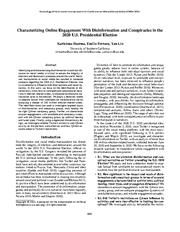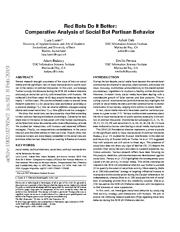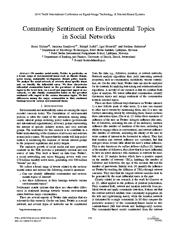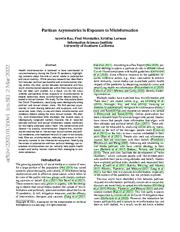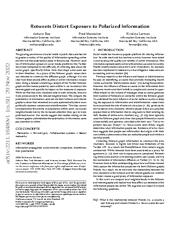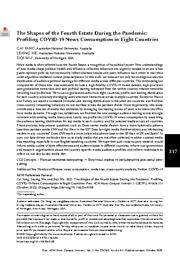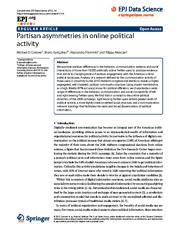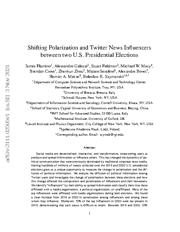A copy of this work was available on the public web and has been preserved in the Wayback Machine. The capture dates from 2017; you can also visit the original URL.
The file type is application/pdf.
Filters
Quantifying Political Leaning from Tweets, Retweets, and Retweeters
2016
IEEE Transactions on Knowledge and Data Engineering
In this paper, we study the problem of quantifying and inferring the political leaning of Twitter users. ...
We formulate political leaning inference as a convex optimization problem that incorporates two ideas: (a) users are consistent in their actions of tweeting and retweeting about political issues, and ( ...
Incorporating tweets and retweets to quantify political leaning: to estimate the leaning of the "sources," we observe how ordinary users retweet them and match it with what they tweet. ...
doi:10.1109/tkde.2016.2553667
fatcat:ucvjer2kancudjhbay2jzn6gjy
Inferring of Political Leaning from Tweets, Retweets of Indian politics
2019
VOLUME-8 ISSUE-10, AUGUST 2019, REGULAR ISSUE
We formulate political leaning inference as a convex optimization problem that consists of ideas: Twitter users generally tend to tweet and retweet constantly, and Similar Twitter users have a tendency ...
By analyzing the political leaning of some amount regularly retweeted property, and get regular clients who retweeted them, and the hash tags utilized by those sources, our quantitative have a examine ...
The second component presents a quantitative take a look at on our amassed tweets from the 2017 election, with the aid of first (a) quantifying the political leaning of a few amount regularly retweeted ...
doi:10.35940/ijitee.k2259.1081219
fatcat:bpu5snpx4zdv3ghdopljc5dhga
Social media polarization and echo chambers: A case study of COVID-19
[article]
2021
arXiv
pre-print
Right-leaning users, we find, are noticeably more vocal and active in the production and consumption of COVID-19 information. ...
First, we propose Retweet-BERT, a scalable and highly accurate model for estimating user polarity by leveraging language features and network structures. ...
Users with the highest number of retweeters from left-and right-leaning users. The bar plots show the distribution of their unique retweeters by political leaning. ...
arXiv:2103.10979v1
fatcat:xjd7mshqjnf5pbkjrqk7ao4tha
Political Polarization Drives Online Conversations About COVID ‐19 in the United States
2020
Human Behavior and Emerging Technologies
We show that COVID-19 chatter in the US is largely shaped by political polarization. ...
By linking 2.3 million Twitter users to locations within the United States, we study in aggregate how political characteristics of the locations affect the evolution of online discussions about COVID-19 ...
Retweet Likelihood From the retweet network, we can quantify how likely users of one hashtag sub-cluster are to retweet from users of another sub-cluster. ...
doi:10.1002/hbe2.202
pmid:32838229
pmcid:PMC7323338
fatcat:bajeoqtja5bwfabsiu6w3ylhfe
Identifying and Characterizing Behavioral Classes of Radicalization within the QAnon Conspiracy on Twitter
[article]
2022
arXiv
pre-print
Leveraging a large dataset of 240M tweets collected in the run-up to the 2020 US Presidential election, we define and validate a multivariate metric of radicalization. ...
Nowadays, QAnon conspiracies often appear in the news, are part of political rhetoric, and are espoused by significant swaths of people in the United States. ...
and endorsing right-leaning political actors. ...
arXiv:2209.09339v4
fatcat:pmaqonj62jh4bc4o4gwfdfkpmq
A Long-Term Analysis of Polarization on Twitter
[article]
2017
arXiv
pre-print
they retweet content from both sides, and (iii) content - how partisan the hashtags they use are. ...
We analyze a large longitudinal Twitter dataset of 679,000 users and look at signs of polarization in their (i) network - how people follow political and media accounts, (ii) tweeting behavior - whether ...
To address this question, we collect data from Twitter related to both social network structure and tweet content for a large set of users (679,000) engaging with US politics. ...
arXiv:1703.02769v2
fatcat:v44beljnjffqzjzorirwhb72pe
Characterizing Online Engagement with Disinformation and Conspiracies in the 2020 U.S. Presidential Election
[article]
2021
arXiv
pre-print
Further, we characterize account engagements with unreliable and conspiracy tweets, and with the QAnon conspiracy group, by political leaning and tweet types. ...
We apply a detection model to separate factual from unreliable (or conspiratorial) claims analyzing a dataset of 242 million election-related tweets. ...
We utilize the retweet network to infer political leaning of other accounts starting from the seed set accounts. ...
arXiv:2107.08319v2
fatcat:e5tj7kzng5brnhfamono7tebbu
Characterizing Online Engagement with Disinformation and Conspiracies in the 2020 U.S. Presidential Election
2022
Proceedings of the ... International AAAI Conference on Weblogs and Social Media
Further, we characterize account engagements with unreliable and conspiracy tweets, and with the QAnon conspiracy group, by political leaning and tweet types. ...
We apply a detection model to separate factual from unreliable (or conspiratorial) claims analyzing a dataset of 242 million election-related tweets. ...
Views and conclusions are of the authors and should not be interpreted as representing social policies of the funding agency, or U.S. Government. ...
doi:10.1609/icwsm.v16i1.19345
fatcat:cd3cyqd6treklkdn4eekmu6eqi
Red Bots Do It Better: Comparative Analysis of Social Bot Partisan Behavior
[article]
2019
arXiv
pre-print
We use the collected tweets to answer three research questions: (i) Do social bots lean and behave according to a political ideology? ...
We collected 2.6 million tweets for 42 days around the election day from nearly 1 million users. ...
RQ1: Bot Political Leaning The combination of the outcome from the bot detection algorithm and the political ideology inference allowed us to identify four groups of users, namely Liberal Humans, Conservative ...
arXiv:1902.02765v2
fatcat:qhr735ohavebvcqio56mcaivq4
Community Sentiment on Environmental Topics in Social Networks
2014
2014 Tenth International Conference on Signal-Image Technology and Internet-Based Systems
We analyze the social network of retweets about specific issues and we identify the influential users. ...
We then characterize influential communities based on the prevalence of discussion topics in the tweet texts. ...
[5] , albeit applied to the problem of political polarization. They construct both, retweet and mention networks from political tweets and apply community detection. ...
doi:10.1109/sitis.2014.27
dblp:conf/sitis/SlubanSJMB14
fatcat:7ljoip3djncr3fvgucaz2pmwje
Partisan Asymmetries in Exposure to Misinformation
[article]
2022
arXiv
pre-print
We study Twitter discussions about the Covid-19 pandemic, classifying users ideologically along political and factual dimensions. ...
While previous research has identified a link between political partisanship and misinformation sharing online, the interaction between partisanship and how much misinformation people see within their ...
From Fig. 8 and Table 2 , we see that misinformative users tweet and retweet more often and have higher overall activity compared to factual users. ...
arXiv:2203.01350v1
fatcat:bjtp6aupujaaziibc54aa55gny
Retweets Amplify the Echo Chamber Effect
[article]
2023
arXiv
pre-print
Using a sample of the Twitter follower graph and the tweets posted by users within it, we reconstruct the retweet graph and quantify its impact on the measures of echo chambers and exposure. ...
The growing prominence of social media in public discourse has led to a greater scrutiny of the quality of online information and the role it plays in amplifying political polarization. ...
For of this study we consider tweets from May 2014 through September 2014, or 43.4M tweets of which 14.8M are retweets. ...
arXiv:2211.16480v2
fatcat:agejdv2ui5eodln65agm75677y
The Shapes of the Fourth Estate During the Pandemic: Profiling COVID-19 News Consumption in Eight Countries
2023
Proceedings of the ACM on Human-Computer Interaction
The methodological components of these new measurements include a high-fidelity COVID-19 tweet dataset; high-precision user geolocation extraction; and user political leaning estimated from the within-country ...
Except for France and Turkey, we observe consistent bi-modal user leaning distributions in the other six countries, and find that cross-country retweeting behaviors do not oscillate across the partisan ...
We also thank the anonymous reviewers and area chairs for their valuable comments that helped shape our methodology and results. ...
doi:10.1145/3610108
fatcat:vz62ajcszfgg3kajgd6bjfj2qq
Partisan asymmetries in online political activity
2012
EPJ Data Science
and a communication network topology that facilitates the rapid and broad dissemination of political information. ...
right-leaning Twitter users. ...
The rapid decay of the left-leaning degree distribution indicates that right-leaning users are retweeted by and retweet content from a larger number of users than those on the left. exponents are similar ...
doi:10.1140/epjds6
fatcat:mylrwbrnhbddvghfg6g3dxnvkq
Shifting Polarization and Twitter News Influencers between two U.S. Presidential Elections
[article]
2021
arXiv
pre-print
influencers and their retweeters. ...
Having hundreds of millions of tweets collected over the 2016 and 2020 U.S. presidential elections gave us a unique opportunity to measure the change in polarization and the diffusion of political information ...
Acknowledgments JF, BC, and BKS were partially supported by the Army Research Office (ARO) under Grant W911NF-16-1-0524 and by DARPA under Agreements W911NF-17-C-0099 and HR001121C0165. ...
arXiv:2111.02505v1
fatcat:wjh2dicwand6jcyiogua5rj7ji
« Previous
Showing results 1 — 15 out of 678 results

